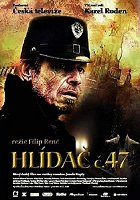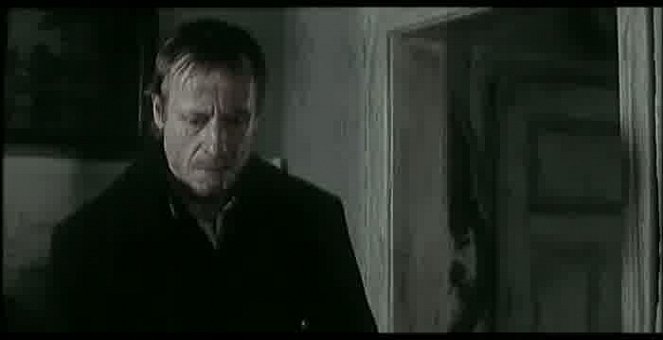Regie:
Filip RenčKamera:
Karel FairaislMusik:
Jiří ŠkorpíkBesetzung:
Karel Roden, Lucia Siposová, Václav Jiráček, Vladimír Dlouhý, Norbert Lichý, Zdeněk Dušek, Vladimír Kulhavý, Luboš Veselý, Zuzana Šavrdová (mehr)Inhalte(1)
Josef Douša moves into the railway guard’s house on the outskirts of a small town. Having just returned from the butchery of trench warfare during the World War I, he is hoping to forget his horrendous experiences in this secluded dwelling with a beautiful young wife by his side. His inner equanimity is further upset by the fact that his wife’s beauty and sex appeal evidently isn’t lost on two men from the nearby town – Ferda, a violent young grave-digger, and Bartík, a hypocritical sacristan. One day Anna really does succumb to Ferda’s animal magnetism. While her husband does not know of what happened. Floundering between doubt and faith in his wife, Josef ultimately loses his hearing and the doctor grants him the status of war invalid. He receives a pension but has to leave the guard house and his job. After a short time his hearing returns, but Josef hides this fact from the whole world and even his wife, hoping to find out if his suspicions about Anna and Ferda are true. Only with superhuman effort does he withstand the sufferings he must face when, as a “deaf” man, he has to listen to the caustic remarks made by people about him and his wife. The story comes to a tragic finale and the victors are death, retribution and solitude. (Verleiher-Text)
(mehr)Videos (1)
Kritiken (4)
Trotz aller Falschaussagen von Renč und der seltsamen PR des tschechischen Fernsehens ist der Film sehenswert. Renč´ Version unterscheidet sich glücklicherweise deutlich von den früheren Bearbeitungen durch Rovenský und Haas. Wir können auf allen Ebenen Unterschiede feststellen, vom Schauplatz in der Winterlandschaft, der Betonung der Kämpfe in den Schützengräben bis hin zu den völlig anders dargestellten Beziehungen zwischen der Familie Douša, sogar ihr älterer Sohn fehlt und die Räume des Gasthauses und des Friedhofs sind sehr wichtig. Der Krämer wurde zum Totengräber und der betagte Ministrant erhielt viel Platz. Das Hauptmotiv bleibt jedoch erhalten, auch die beklemmende Atmosphäre, aber die Beweggründe für die Handlungen der Hauptfiguren sind eher der heutigen Zeit angepasst. Die Moral der echten Landbevölkerung der 1920er Jahre ist heute für die breite Öffentlichkeit unverständlich. Neben den schönen Bildern bietet der Film auch hervorragende Leistungen von Roden und Vladimír Dlouhý, aber leider sind ihre Gegenspieler Siposová und Jiráček sehr schwach. Siposová schaffte es zumindest, sich zu stilisieren, aber Jiráček wurde nie ein richtiger Schauspieler, obwohl er viele Möglichkeiten hatte.
()
Karel Roden – gut. Vladimír Dlouhý – gut. Václav Jiráček – fürchterlich. Lucia Siposová – sieht nur schön aus. Die Kamera – schön. Die Musik – geht so. Die Regie – der typische Renč, d. h. nicht besonders interessant und schwach. Ich kann mir vorstellen, dass eine verkürzte Fassung dieses Films (anderthalb Stunden), bzw. eine zweiteilige Version am Sonntag um 20:00 Uhr im Fernsehen läuft. Ins Kino hat er nicht gepasst. Zwei Sterne und ein Stück.
()
Probably the best movie by Filip Renč and the first of its kind, where after watching it, I didn't feel the need to be enthusiastic about my dance steps or satisfy my shopping cravings. I don't particularly like this director because of his music video-like and mostly commercial aesthetics, so I can't give it more than four stars, even if I wanted to. I don't take away from the film its decent craftsmanship, good camera work, or soundtrack, but it seems to me that the director is always playing for effect, so the characters overact a little, displaying overly exaggerated emotions. The music and visuals aggressively attack the viewer's senses - and maybe I am just biased because I don't agree with Renč's political and lobbying contacts and business deals. Overall impression: 60%.
()
I actually don't know what I expected from the movie "Guard at Number 47." Maybe a bit of a war movie, perhaps a little action. I'm not saying that there isn't anything like that, but it's just about snippets, memories of the main character, Josef Douša, in the trenches. The interweaving of reality with memories is really strong, intense, and along with Karel Roden's acting in the lead role, they are the greatest positives of the film, which is nothing more than a story about a love triangle and the consequences that such a situation can have and does have. Sometimes it just doesn't pay off when you save someone's life. Within ten to fifteen minutes, the basic plot is established, which is also almost immediately resolved. The film doesn't bring any surprises and in terms of the screenplay, it's a classic story that doesn't stand out in any way. It was mainly a great opportunity for Roden, who truly played a concert and in moments when he has to play a deaf character, he is absolutely perfect. Apart from his appearance, his voice, which is also unforgettable, helps him in that as well. Lucia Siposová or Václav Jiráček next to him then look like two students who have just enrolled at FAMU and already think they can play in the premier league. Their acting is not very suggestive and not very believable. They are not characters, they just play them. Roden is a character, Roden is Douša. When I think about those actors, I certainly can't forget about Vladimír Dlouhý, who is incredibly sleazy and the second-best actor in the film after Roden. Filip Renč managed to shoot a film that doesn't have as much potential as it may seem. Actually, it is a chamber film of one person who is not living a good life, but on the contrary, is suffering and it doesn't seem like it will ever end. More: http://www.filmovy-denik.cz/2012/12/umirajici-zvire-4-vanoce-slunce-seno-2.html
()



Werbung